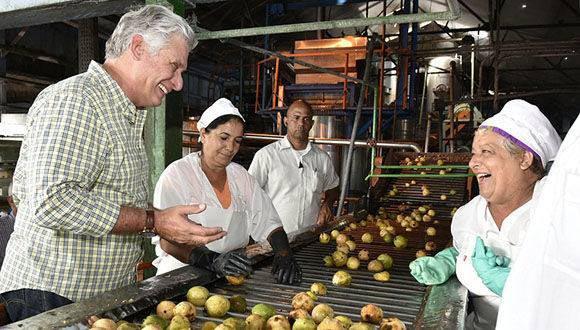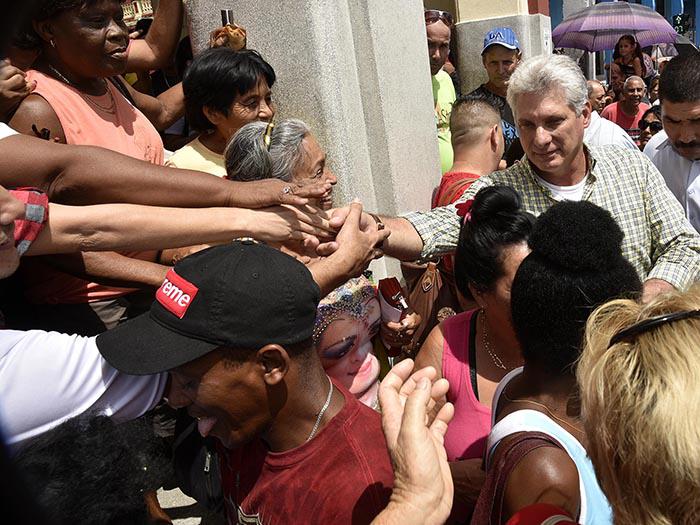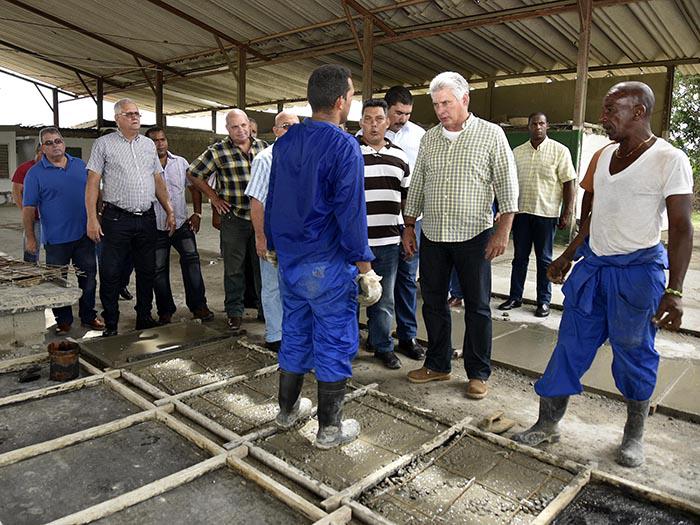
What we want to accomplish with this regular contact, plus the dialogue, is help facilitate solving problems, said Miguel Díaz-Canel Bermúdez, President of Cuba's Councils of State and Ministers, at the Hermanos Saíz Montes de Oca University, during the first day of a government visit to the province of Pinar del Río.
After participating in a consultation assembly here to discuss the draft Constitution, Díaz-Canel noted that the visit was not only a personal one, but of the Council of Ministers, as well.
He explained that several ministers accompany him on the tours he has conducted across the country, and return to continue their work within the framework of their ministries, better informed as a result of contact with local governments.
"At the conclusion (of visits), projections emerge for next year's economic plan, and things that we can help resolve in some way. This is what we want to establish with this work style: that the government is at the service of the population," Díaz-Canel said.
"If there are big problems that cannot be completely solved, we can always try to bite off a little piece and make a little progress," he added.
With the goal of taking the province's pulse, the President conversed openly with people at every one of the sites visited, and even stopped the entourage in downtown Pinar del Río, to get out of his car and greet the population.
"They have told us very honestly about problems in the province: transportation, water distribution, prices, salaries, the availability of construction materials, delays in building housing. The people have been very transparent," he said.
The first stop of the President's tour was at the Conchita fruit and vegetable processing plant, which at one time exported eight different lines of preserves. Currently, as a result of antiquated technology and the poor condition of most equipment, no products are exported.
Díaz-Canel learned that this year, following a lengthy investment project, the factory's waste treatment system should be ready, a critical step in the plant's modernization.
Iris Quiñones Rojas, minister of Food Processing Industry, explained that planned for 2019 is the remodeling of bays now used as warehouses, to prepare them to house new production lines that will comply with established food safety standards.
The President insisted on the need to accelerate the project as much as possible, considering the growth of agriculture in the province and the prestige of the Conchita brand.

"This is an emblematic industry; the people of Pinar defend it and all of Cuba knows its products," he said.
Next, as has become customary during these visits, leaving protocol to one side he toured the facility, getting his shoes dirty alongside the guava and papaya lines. He climbed up on the equipment and talked with the men and women who despite the plant’s deterioration made it possible for La Conchita to deliver the country's best performance this year during the mango and tomato processing seasons.
One of these workers was Yusimí Sánchez, who told the President of her dissatisfaction with wages during certain times of the year, when economic activity decreases, but also reiterated her commitment to the company where she has worked as an operator for 18 years.
"This is a battle-tested workforce,” she told him.
Tranquilino Sandalio de Noda High School, an institution where students have been trained in agricultural specialties for 106 years, was another site visited in the province.
Here Díaz-Canel took interest in the quality of classes, students' motivation, and what they hoped to do upon graduation.
"Are students learning today like you did?" he asked Yaquelín Barrios, who graduated from the school 18 yeas ago and now works here as a teacher.
He asked for opinions on the draft Constitution currently under discussion, adding, "There is much interest in what youth can contribute to this debate. It's very important that you participate, because this is a Constitution for the present, but above all for the future of the country."
He talked about the constitutional reform with students and professors at Hermanos Saíz Montes de Oca University, too.

On this issue, he commented that Western media, principally the press attacking Cuba, have attempted to spread two fundamental points of view, "one is that the Cuban citizen is not interested in the Constitution. This lie falls apart quickly, since the tabloids (of the draft) have run out and in many places they have asked for another edition," Díaz-Canel said.
"The second aspect that they have tried to impose on us is that this is a useless exercise since the Constitution is practically already approved, and this is just a show.
"But I am convinced that the definitive text is going to be stronger, after we incorporate the contributions people are making," he insisted.
The government tour also included a stop at a building materials production site, affiliated with the Maintenance and Civil Construction Enterprise, and Los Pinos store, where a large portion of the small plant's products are sold, primarily to persons who have been awarded a subsidy to repair or expand their homes.
On this note, the President insisted on the importance of fighting crime and not allowing hoarding or reselling by unscrupulous individuals, stating, "We need to be severe with this."
As this article is submitted, Díaz-Canel continues his tour of sites in Pinar del Río, accompanied by Julio César Rodríguez Pimentel, Party first secretary in the province; Ernesto Barreto Castillo, president of the Provincial Assembly of People's Power; and several other ministers and officials.















